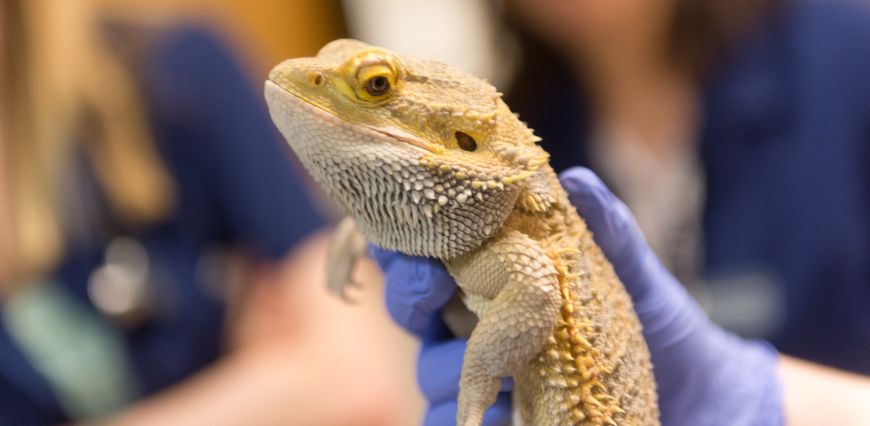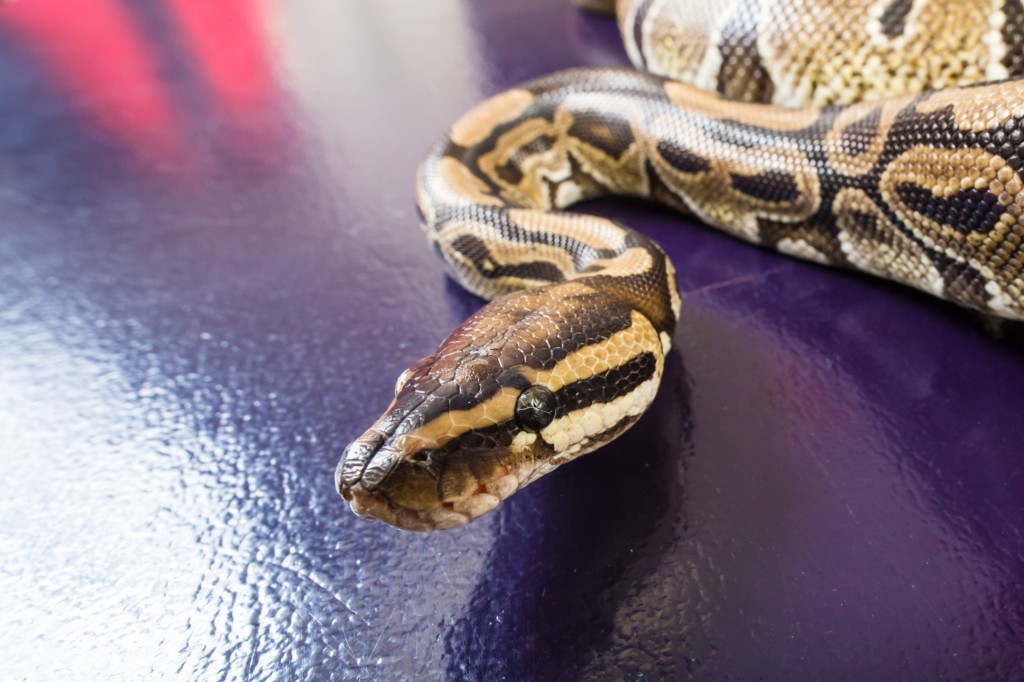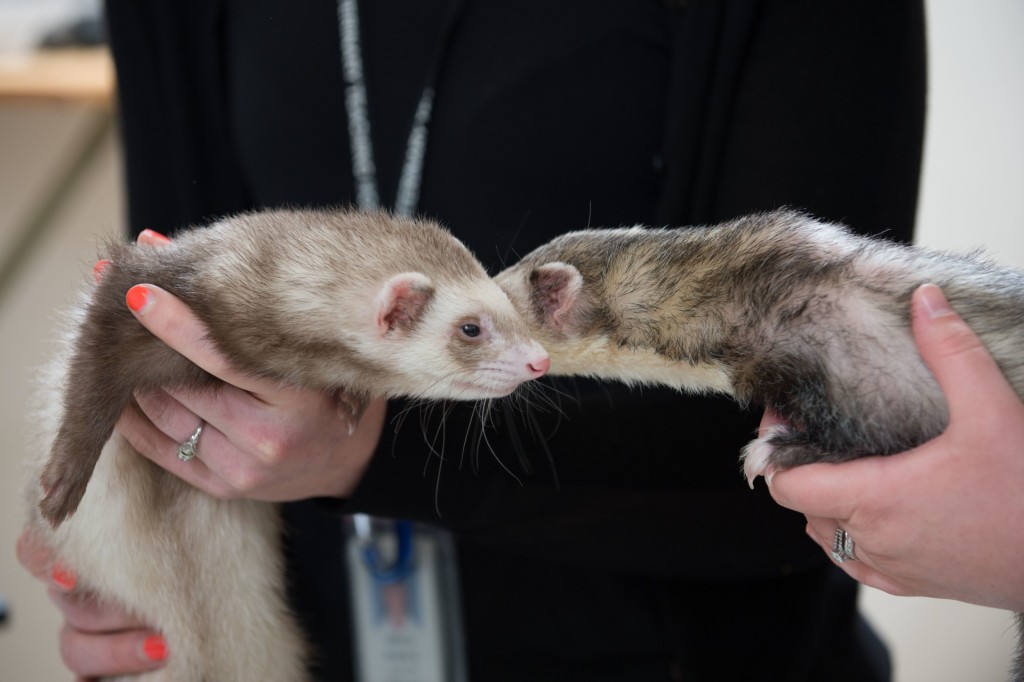
By Dr. Matthew S. Johnston
Many people are attracted to exotic pets for their unusual and fascinating qualities. Tarantulas, bearded dragons, chinchillas: These and other animals are good fits for some households.
It’s critical for the sake of the animal and your family to avoid an impulse buy and to understand the needs and costs that come with an exotic pet. Consider how long the animal will live, what it will eat, where it will sleep, and how it will fit in with your lifestyle.
Here are a few precautions regarding exotic pets:
- Caretaking is not necessarily easier or cheaper for an exotic pet than for a dog or cat.
- Exotics often live for many years; find out about typical longevity before you buy.
- Dietary needs may be demanding; consider food availability, costs and other issues. For instance, snakes typically need live whole prey. Make sure you are prepared to fill the needs.
- Many exotic pets may shed Salmonella bacteria, meaning people must take care with handling and hand-washing to avoid illness. This can be a serious issue: Hundreds of people have become ill in nationwide Salmonella outbreaks linked to pet turtles, according to the Centers for Disease Control and Prevention.
- Understand federal and state laws regulating ownership. Colorado law generally prohibits possession of wildlife, so if an animal was captured in the wild keeping it as a pet likely is illegal or requires a special permit in our state. Ownership of some animals – including monkeys – is illegal except under very narrow licensing and registration requirements.
- Beware of fad pets, such as hedgehogs and sugar gliders. Ownership of some fad animals is illegal in some places. Although many of these critters are cute, they are not necessarily cuddly – and care can be very demanding to keep the animals in good health.
Not every pet is right for everyone, and not every person is right for each pet.
Here is a guide to help choose an exotic pet that might be right for you.
Arthropods (Invertebrates)

I love invertebrates. They are entertaining, some of their behaviors are fascinating, and they’re educational. Insects might be a great choice for a child who enjoys science. But don’t let your bug-loving kid plop the pet tarantula on Grandma’s lap without her permission; we’ve seen trauma to spiders as a result.
Advantages: Inexpensive, hypoallergenic, fascinating to kids, short life span (most live about two years), relatively easy care, interesting and educational.
Disadvantages: Potentially venomous, “gross” to some people, not cuddly or interactive, short life span might be a downside.
Lizards
There are no easy reptiles, but the bearded dragon and the leopard gecko are two I suggest as pets for first-time lizard owners. They are docile and easy to handle – yet also gregarious, playful and fun to watch. And they are beautiful, at least to some animal lovers. Lizards do have specific dietary needs. In fact, some of our clients give their pet lizards fresh homemade salad every day.
Advantages: May be tamed, hypoallergenic, fascinating, beautiful.
Disadvantages: Generally difficult care, with daily requirements; cannot be left alone for long periods; many are wild-caught, making ownership illegal in some states; may injure handlers with bites, scratches or tail whips; may shed Salmonella.
Snakes

Snakes are beautiful and fascinating to many people: More than 500,000 American households keep snakes as pets. But many people are afraid of snakes – so afraid, in fact, that they have an irrational fear known as ophidiophobia. If you get a snake, be prepared for some friends and family members to have negative reactions. Also know that snakes require a whole-prey diet, such as chicks, mice or insects; if this bothers you, snakes might not be your best choice.
Advantages: Easiest care of reptiles; common pet species are docile and easy to handle; hypoallergenic.
Disadvantages: About 30 percent of people are ophidiophobic; foul odor if dirty; whole-prey food; many wild-caught, making ownership illegal in some states; not cuddly; may shed Salmonella.
Turtles and tortoises
Turtles and tortoises are the most commonly kept reptile pets, and ownership has grown over the past five years. The American Veterinary Medical Association estimates there are 2.3 million turtles kept as pets in the United States. Turtles form a bond with their owners. But these are not simple pets: They generally require specially prepared diets, they need special lighting, and daily needs mean they cannot be left alone for long periods. In addition, turtles are the most infamous Salmonella shedders of the animal world. Added together, these factors often make turtles a poor choice as a first pet for children.
Advantages: Can bond with owner; generally harmless; aquatic, semi-aquatic or terrestrial; beautiful and fun to watch.
Disadvantages: Need daily care and maintenance; many wild-caught, making ownership illegal in some states; infamous for shedding Salmonella.
Chinchillas
Chinchillas are a fantastic mammalian pet to consider. They are highly entertaining and will literally bounce off walls and do flips. Chinchillas are healthiest in cool temperatures and low humidity, so they thrive in places like Colorado’s Front Range – as long as they live in a home that stays below 80 degrees or has air conditioning.
Advantages: Cute, fascinating behavior, can be tamed, relatively easy care, harmless, least allergenic of pet rodents.
Disadvantages: Dusty, need cool temperatures and low humidity.
Rabbits
Rabbits and ferrets are the most common mammalian pets, numbering 3.2 million nationally. Bunnies have big personalities but can bite and scratch if not hand-tamed. Think “Monty Python”-type rabbit. Rabbits also shed and shred, so rabbit ownership means rampant rabbit fur, and they will chew almost anything they can get their teeth on.
Advantages: Highly interactive; cute and cuddly; can be housed outside or indoors, and may be litter trained; can free-roam in the house.
Disadvantages: Difficult captive husbandry; may bite and scratch if not hand-tamed; allergenic; shedding; destructive chewing.
Ferrets

On the plus side, there are commercially available diets for ferrets, and it is rare for a ferret to bite. About 300,000 households keep ferrets as pets. But ferrets, especially males, have a distinct odor that strikes some people as stench. There is no way to get rid of ferret odor, regardless of claims you might read. Ferrets also tend to develop diseases that are not cheap to treat.
Advantages: Very gregarious and playful; generally docile and easy to handle; commercial food available; can be litter trained.
Disadvantages: Malodorous; destructive; expensive veterinary care; illegal in some locales, including the state of California and city of Boston.
Learn more
I recently offered a webinar about choosing an exotic pet; during the presentation, I discussed other pet rodents, including rats, gerbils, hamsters and guinea pigs. Visit here for more information.
Keep in mind
Use caution with online resources, as myths and misconceptions circulate about exotic pets. The American Veterinary Medical Association recommends the WebMD Pet Health Community, a forum moderated by member veterinarians.
Before taking home an exotic pet, educate yourself by talking to an exotics veterinarian or to others – such as rescue organizations, animal shelters and breeders – who known about these animals and see them on a regular basis. Doing your homework will help ensure success for you and your unusual pet.
Dr. Matthew S. Johnston is a veterinarian and associate professor of Avian, Exotic, and Zoological Medicine at Colorado State University’s James L. Voss Veterinary Teaching Hospital.